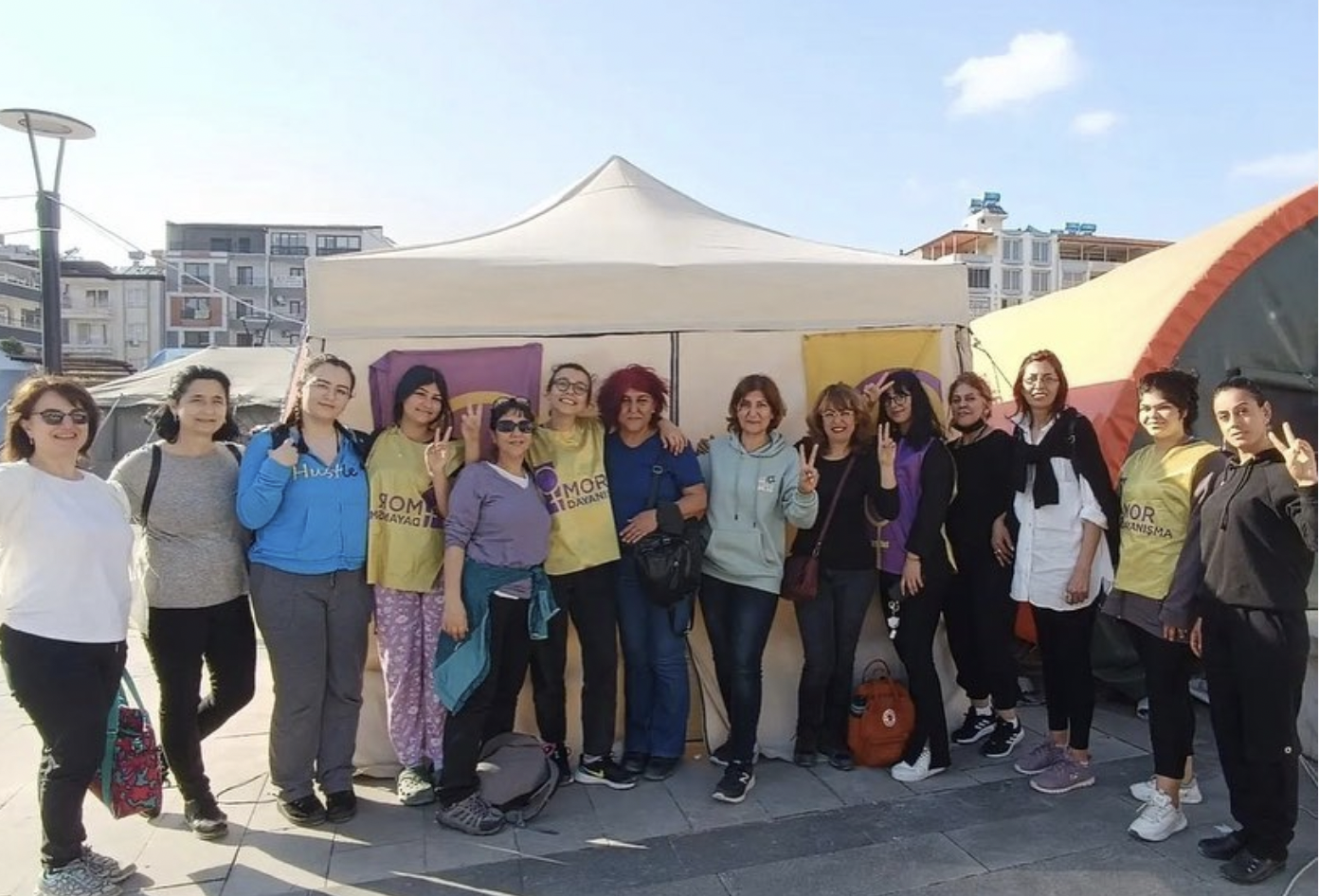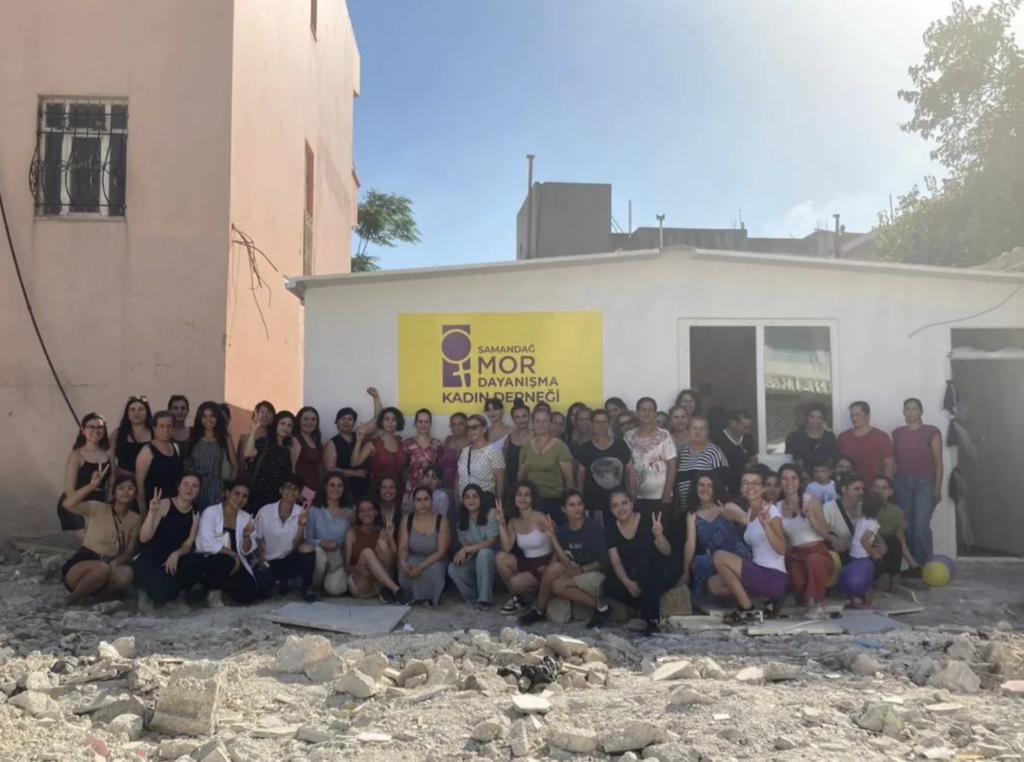Update about our work in the earthquake regions!
On February 6, 2023, the southeast of Turkey and the northeast of Syria were hit by a series of devastating earthquakes that have since officially taken over 59,259 lives, left more than 130,000 people injured and without homes, and directly impacted more than 15 million people.
Since day one, Mor Dayanışma has been collecting, transporting and distributing aid in the southeast of Turkey and forming volunteer teams, including specialists that are part of respective medical, search and rescue, and psychosocial support teams. As a feminist organization, we have prioritized the building of women’s solidarity units, women’s tents and solidarity networks for women, children and LGBTQIA+ people affected by the earthquakes.

Mor Dayanışma established women solidarity centers in 3 districts and 4 neighborhoods of Hatay, which is one of the areas that has been most severely impacted; Atatürk neighborhood in Samandağ, Serinyol and Armutlu neighborhoods in Antakya, and Harbiye neighborhood in Defne. We have set up 4 women’s tents in Samandağ where women and children can stay, and one women’s tent in each of the other neighborhoods. In addition to these tents, we distributed around 20 four-person tents and 10 twenty-five-person tents to be set up in women’s own gardens or fields, and we provided assistance in setting up the tents.
We have been working towards more sustainable forms of community shelter in collaboration with local women in Samandağ. In July 2023, we established the Mor Dayanışma Samandağ Association, led by the women in and from Samandağ, in a newly built prefabricated building.
The opening of our community meeting space in Samandağ on July 15th.

In this women’s community center, we hope that women and children can feel safe and women can practice their knowledge –tailoring, hair care, simple farming, soft cooking– to support their economy, and regain their financial independence and their mental strength.
Mor Dayanışma will continue to try and respond to earthquake survivors’ most urgent needs. However, we are now in need of consistent and long-term international solidarity. We are faced with a large-scale disaster, the effects of which will last for years, and an authoritarian government unwilling to acknowledge its complicity and responsibility in the crisis by claiming it a “natural” disaster. It is crucial that the political nature of this disaster be known and widely recognized, and an adequate disaster response be implemented.
The current earthquake disaster is political because of the many pre-existing and known risk factors which multiplied its impact, and the lack of fair and coordinated relief efforts in its aftermath;
The government had prior knowledge of risk and yet ignored the consistent warnings about the region along this fault line needing earthquake-regulated construction and fortification. In addition, Turkey’s construction industry was known to be corrupt, with construction companies paying bribes to circumvent earthquake regulations, and being periodically granted “construction amnesties” by the government.
The government has been disrupting civil disaster response by trying to centralize aid distribution, and criminalize the majority of solidarity efforts initiated by grassroots organizations, unions, NGOs and dissident political parties. All the while, the state’s official disaster response continues to be insufficient, uncoordinated, delayed and discriminatory. This is in part because the region where the earthquakes struck is home to many communities who are persecuted under the current government, including Alevis, Kurds, Arabs, Assyrians, Armenians, Greeks, Chaldeans and Jews. There are also 1.6 million documented refugees living in the region, most of whom were displaced due to the war in Syria.
Currently, the majority of earthquake survivors have still not received adequate shelter. There are still water shortages, inadequate drinking water and no electricity in many areas of the earthquake zone. Vulnerable groups (women, children, refugees, ethnic and religious minorities, migrants, LGBTQIA+ people, the disabled and the elderly) face increased risk as they may be excluded or deterred from receiving aid, shelter and health care, and are often targeted and attacked.
This disaster has had a devastating effect on the region at every level, from its physical infrastructure to its community life. We must listen to the survivors, understand their needs, and work with them to rebuild life in the region. The sheer scale of the destruction, coupled with the incompetence of the state’s disaster response and its continued repression of solidarity efforts has greatly impeded the efforts of grassroots organizations to assist in this rebuilding. It is crucial now that we foster international solidarity by connecting with activists, specialists and organizations abroad to share experience and expertise, approach the crisis from a feminist perspective and find solutions together.
If you would like to get in contact and/or support our efforts, you can write to us at dayanismamor@gmail.com, or send us a message on Instagram, Twitter or Facebook.
You can find out more about Mor Dayanışma on our website and social media.
Further reading:
[1] İrem Kayıkçı, From the Women’s Tent – Te Büsik İydik Ya Hayti (February 20, 2023).
[2] Human Rights Foundation of Turkey, Report On Human Rights Violations Between 6 – 27 February 2023 After the Earthquakes in Antep, Maraş, Hatay And Malatya (March 3, 2023).
[3] The Association for Migration Research, Migration and Earthquake – Due Diligence Report (March 16, 2023).